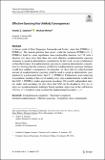Files in this item
Effective guessing has unlikely consequences
Item metadata
| dc.contributor.author | Salamon, András Z. | |
| dc.contributor.author | Wehar, Michael | |
| dc.date.accessioned | 2023-03-28T15:30:15Z | |
| dc.date.available | 2023-03-28T15:30:15Z | |
| dc.date.issued | 2023-06-01 | |
| dc.identifier | 283498385 | |
| dc.identifier | 12f853e8-e9c5-4fdf-b216-b20bcd95a64a | |
| dc.identifier | 85150696691 | |
| dc.identifier.citation | Salamon , A Z & Wehar , M 2023 , ' Effective guessing has unlikely consequences ' , Theory of Computing Systems , vol. 67 , pp. 548-568 . https://doi.org/10.1007/s00224-023-10119-x | en |
| dc.identifier.issn | 1432-4350 | |
| dc.identifier.other | ORCID: /0000-0002-1415-9712/work/132214028 | |
| dc.identifier.uri | https://hdl.handle.net/10023/27282 | |
| dc.description | Funding: EPSRC Grant number EP/P015638/1. | en |
| dc.description.abstract | A classic result of Paul, Pippenger, Szemeredi and Trotter states that DTIME(n) ⊊ NTIME(n). The natural question then arises: could the inclusion DTIME(t (n)) ⊆ NTIME(n) hold for some superlinear time-constructible function t(n)? If such a function t(n) does exist, then there also exist effective nondeterministic guessing strategies to speed up deterministic computations. In this work, we prove limitations on the effectiveness of nondeterministic guessing to speed up deterministic computations by showing that the existence of effective nondeterministic guessing strategies would have unlikely consequences. In particular, we show that if a subpolynomial amount of nondeterministic guessing could be used to speed up deterministic computation by a polynomial factor, then P ⊊ NTIME(n). Furthermore, even achieving a logarithmic speedup at the cost of making every step nondeterministic would show that SAT ∈ NTIME(n) under appropriate encodings. Of possibly independent interest, under such encodings we also show that SAT can be decided in O(n log n) steps on a nondeterministic multitape Turing machine, improving on the well-known O(n(log n)c) bound for some constant but undetermined exponent c ≥ 1. | |
| dc.format.extent | 21 | |
| dc.format.extent | 468749 | |
| dc.language.iso | eng | |
| dc.relation.ispartof | Theory of Computing Systems | en |
| dc.subject | Computational complexity | en |
| dc.subject | Structural complexity | en |
| dc.subject | Limited nondeterminism | en |
| dc.subject | Effective guessing | en |
| dc.subject | Complexity class containments | en |
| dc.subject | QA75 Electronic computers. Computer science | en |
| dc.subject | T-NDAS | en |
| dc.subject | NCAD | en |
| dc.subject | MCC | en |
| dc.subject.lcc | QA75 | en |
| dc.title | Effective guessing has unlikely consequences | en |
| dc.type | Journal article | en |
| dc.contributor.institution | University of St Andrews. Centre for Interdisciplinary Research in Computational Algebra | en |
| dc.contributor.institution | University of St Andrews. School of Computer Science | en |
| dc.identifier.doi | https://doi.org/10.1007/s00224-023-10119-x | |
| dc.description.status | Peer reviewed | en |
This item appears in the following Collection(s)
Items in the St Andrews Research Repository are protected by copyright, with all rights reserved, unless otherwise indicated.

